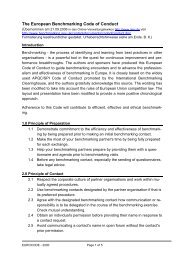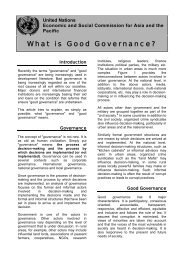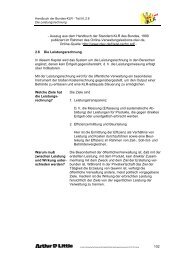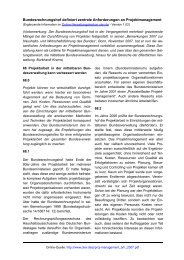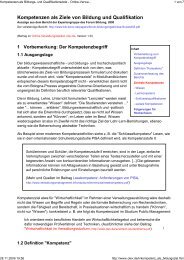Strategy Survival Guide
Strategy Survival Guide
Strategy Survival Guide
You also want an ePaper? Increase the reach of your titles
YUMPU automatically turns print PDFs into web optimized ePapers that Google loves.
<strong>Strategy</strong> <strong>Survival</strong> <strong>Guide</strong> Version 2.1<br />
Prime Minister’s <strong>Strategy</strong> Unit<br />
home | strategy development | strategy skills | site index<br />
<strong>Strategy</strong> Skills > Structuring the Thinking<br />
First principles thinking<br />
Although strategy needs to be developed with a pragmatic and realistic understanding of delivery constraints<br />
and real world complexity, it is important that strategic thinking is not constrained or limited by existing legacy<br />
norms and assumptions.<br />
What Is It?<br />
Going back to first principles is simply a way of thinking that challenges implicit assumptions and current<br />
approaches, and uses an objective assessment of available evidence and knowledge to come to fresh<br />
logical conclusions.<br />
Why Is It Useful?<br />
Situations often arise where the current state of affairs would never have been explicitly designed or<br />
intentionally constructed. Rapidly changing environments or a history of uncoordinated incremental<br />
interventions can result in unintended consequences and behaviours driven by distorted incentives.<br />
In the same way, the rationale for a policy programme or intervention can become lost or muddied over time.<br />
It is possible for policies to acquire legitimacy simply by virtue of being in place for long periods, with the<br />
original underlying assumptions becoming so taken for granted that they become received wisdom. Standard<br />
behaviours and ways of working are then in danger of continuing unchanged despite these assumptions<br />
having long lost their validity.<br />
By going back to first principles it is possible to take stock of a policy – how it fits with and drives towards<br />
strategic outcomes, and whether it is still an effective means of addressing the underlying problem. First<br />
principles thinking encourages an explicit recognition of the drivers, incentives and rationales driving<br />
behaviours and interactions in a system and ultimately challenges resource allocation decisions.<br />
The Necessary Conditions<br />
Obtaining a mandate for the kind of fundamental re-evaluation encouraged by first principles thinking is one<br />
of the biggest challenges in strategy development. Those working within clearly defined strategy projects<br />
commissioned by high-level sponsors such as ministers may be given such a remit, but those developing<br />
new strategies within their policy areas too often come up against fixed boundaries.<br />
Going back to first principles can mean re-opening issues that have lain dormant for years, and allows no<br />
room for sacred cows or ‘undiscussables’. For strategy work to be truly effective, the importance of gaining<br />
the commitment of stakeholders to a fundamental re-think can not be understated.<br />
It is also important to nurture a conducive culture and working style – one in which norms can be challenged<br />
and creative ideas are encouraged. ‘Greenhousing’, or protecting creative ideas that are generated in<br />
brainstorms, is an important way of encouraging innovative and fresh approaches to an issue rather than<br />
immediately finding faults or flaws in an idea.<br />
Stepping outside of the current situation, and identifying and setting aside current assumptions requires<br />
space and time to think. This is naturally easier in the context of clearly defined strategy projects than in<br />
business-as-usual situations. However, it is equally important in both situations if strategy is to be not only<br />
developed effectively but also fine-tuned to remain effective in response to a changing environment.<br />
Physically leaving the location embodying the current situation through an away day can be a more than<br />
symbolic way of creating space to think. It can help to provide some useful distance from both the<br />
<strong>Strategy</strong> <strong>Survival</strong> <strong>Guide</strong> – <strong>Strategy</strong> Skills<br />
Page 94



